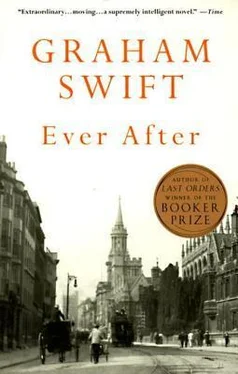That’s what it must have felt like when she woke at night to an empty space beside her and knew that he was still down there at his desk: that he was deserting her. She must have thought of ways to get him back.
Who is Elizabeth? What is she? I see her as a warmhearted, trusting, perhaps rather brittle girl, emerging suddenly from the chrysalis of life at the Rectory into the full bloom of womanhood. Any man, perhaps, might have been the touchstone; it happened to be Matthew. It was her fortune, and her misfortune, to marry Matthew. And strange that this robust and outgoing man, to whom she had looked to lead her, some way at least, out of the sheltered existence that she could admit now had been hers, should himself slip so easily into domesticity and family-hood, should choose to settle, after all, right here in Burlford, under the eye, as it were, of the Rector and her mother, should even seem now and then to need a sort of shelter himself. It must mean he was happy; that she made him happy.
She has soft brown eyes and the smile of newly awakened, newly indulged instincts; the clear conscience and undissipated emotions of a clergyman’s daughter. What did she think of her husband’s “interests”—the specimen-collecting, the reading-up in learned tomes and journals? Perhaps they seemed, at first, endearingly, if vexingly, like her father’s interminable devotion to Virgil. Men seemed to need these “enthusiasms,” which rapidly became so all-consuming. She had thought, perhaps, that her own sex, with its needlework, sketching and piano-playing, was lacking in this respect. But now, watching little Christopher at play, watching the earnestness with which he went about it — a furrow in his brow just like one in Matthew’s — she would have felt more of concern than envy for these curious menfolk. But she would no more have dared knock on Matthew’s study door and urge him, for his own sake, to stop, than she would have dared ask her father (though perhaps she had the subversive thought) why he, a minister of the Christian church, should spend so much time in the company of a pagan poet.
She has deep-brown hair and a soft, ripe bosom. And she is perfectly capable, now that she has discovered her instincts, now that she knows, beyond all girlish dreams, the full extent of her power to give and receive love, of concurring absolutely with that motto (what if they were the words of a pagan poet?) which Matthew’s father had had inscribed for them. Yes. Amor vincit .
2nd March 1860:
Neale here again for Sunday dinner. And playing very merrily afterwards with John and Christopher and offering them fine exhortations as to how they are almost grown men now, with “places to take in the world.” Cannot help supposing that these visits are encouraged by Elizabeth in collusion with her father, so as to preserve our Sundays from the animosity that now so often springs up between myself and the Rector following our church-going. Suspect also that the Rector has had private words with Elizabeth about the parlous state of my father’s affairs — how, in plain terms, if I do not have a care and desist from lending my father money, the taint will spread to my own reputation.
Neither of these suspicions becomes me. Yet suspect also that Elizabeth wishes, out of an understandable and not uncharitable motive, to put Neale before me as an example of what I should be, and, indeed, once was before my falling off of these last months. That is: sanguine, cheerful, dependable, steady in my responsibilities and successful in my affairs. Yet cannot, for the life of me, see myself in Neale (or him in me) at all. Distrust my former liking of him. Despise my own distrust and upbraid my own seeming want of character. Should perhaps be simply jealous and act the plain part of jealousy. Nothing, in fact, might better restore me in my Lizzie’s eyes — proving I was a creature still of direct and vivid emotions, and not the remote occupant of my own incapacitating thoughts.
Yet I disdain to be — even as I become the very thing — the pallid husband resenting the vigorous interloper. And I disdain (pride! Oh, pride!) to engage in matrimonial histrionics, when it is indeed my “thoughts” which are the nub of the matter.
Neale asks, in seeming candour or in seeming tact, after my father. Wheal Talbot fares well. Neale, in truth, is a rich man, an eligible match, slow to take his pick, and the story goes that he pays court to the fair daughter of one of our reduced gentry — or, rather, that she pays court to him. He observes that Benson (do I remember our “scourge of the boll weevil”?) does well enough out of his arsenic licence, and wittily remarks that while he extracts the “cordial” of the mine, Benson extracts the poison. Adds that Benson may be obliged shortly to interrupt his war against the weevil, if the States, as seems almost certain, go to war themselves. Might advise him that at such time it would be opportune to buy back the arsenic rights and thus secure, against future vicissitudes, another basket for his eggs. Might remind him also that Wheal Talbot does not command the richest section of the lode, and he would do well to sink exploratory shafts for tin while there is time and capital. But this perhaps would be only my “circumspection” speaking — who now sees any perils in the copper market? — and I do not wish Liz to suppose that I resent Neale’s success.
But these pages should not be a furtive laboratory in which I analyse my wife. God forbid that she should think that that is the object of these “studies” of mine. Truly I believe that — still — she would never dare touch a single page of these notebooks without my permission. Yet, while I closet myself repeatedly in their fellowship, has she not a right to be jealous?
What would I do without her? What would I have become without her? What price should I not pay not to lose her? I do believe she would forgive and forget all my strange humour of late, if I would only, as she once, so warily, entreated me, call upon my better nature and “be myself again.”
“Better nature”? What, in any of us, is our “better nature”? And what does it mean — is this what we love and respect in each other? — to “be oneself”?
So what are we supposed to believe here? Forget what Matthew, by now an almost confirmed non-believer, believed or didn’t believe. Consider the facts. Matthew left Burlford (and Elizabeth) in July 1860. Under new laws — imagine the Rector’s mortification — Elizabeth obtained a divorce, on grounds of desertion. I am working now from data outside the Notebooks (I have done my background research), which stopped with Matthew’s departure. Elizabeth married James Neale in November 1862. Neale, with his lucrative stake in a copper mine, and something of a charmer, had been on the scene at least since 1856. So what are we supposed to believe? That from 1854 until 1860 Elizabeth held out, the mystified, forbearing, loyal, loving wife, until it was all up? And then, and only then—?
Let’s read between the lines. Let’s be brutal and modern and take apart these precious Notebooks — this precious marriage of Matthew and his Lizzie. Forget his numerous avowals. Forget that last letter from Plymouth. Hogwash! Eyewash! When it comes down to it, Matthew was just another disillusioned idealist, an over-reactive Hamlet type — couldn’t take it that the world was real. See how he lapses into whingeing sentimentality. What price would he not pay not to lose her? But he did lose her. He left her on a July day in 1860. Though she had left him, perhaps, long before that.
And while we’re about it, we may as well ask the big question: which came first — the failed marriage or the ideological anguish? Which would Potter go for in his TV production? The fully licensed historical protagonist? The tortured man of his time? But think of rooms and beds and breakfast tables. (Think of the private life of Michael Potter.) Let’s face it — for at least six years they were in a state of marital shut-down. The good husband confides in his wife. Matthew kept it all to himself. Reason: some day he might just come out of it all, and there would have been no point in telling. But that way he dug a deeper and deeper pit for himself, and when he finally crawled out of it to tell her, can you blame her for feeling cheated — for having already made her contingency plans?
Читать дальше












